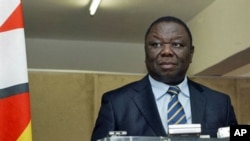Zimbabwe's power-sharing government is in crisis as Movement for Democratic Change leader, and prime minister in the government of national unity, or GNU, Morgan Tsvangirai says President Robert Mugabe has broken the constitution by unilaterally appointing senior public servants. And experts warn that the military and security establishment in Zimbabwe has too much control over the political process.
Mr. Tsvangirai said Thursday that he learned at a meeting with Mr. Mugabe earlier this week that ZANU-PF members had been appointed as provincial governors. He said these appointments were both illegal and unconstitutional. In terms of the two year old global political agreements any public service appointments must be made in consultation with Mr. Tsvangirai.
"My party's national executive has today resolved that we must make a stand to protect the constitution of Zimbabwe and to return it to custodianship of the citizens of this country," said Prime Minister Tsvangirai. "As the first step we will refuse to recognize any of the appointments which President Robert Mugabe has illegally and unconstitutionally made over the past 18 months."
The political agreement was guaranteed by South Africa and the regional group, the Southern African Development Community, or SADC.
"I now call upon President Mugabe to return this country to constitutional rule by correcting the unlawful appointments. I invite SADC to work urgently for a return to constitutional government," said Mr. Tsvangirai.
So, far, there has been no reaction from Mr. Mugabe regarding Mr. Tsvangirai's comments.
Mr. Tsvangirai said he had taken considerable political risk by signing the political agreement and entering into a government of national unity with unreliable partners, Mr. Mugabe and ZANU-PF.
Political analyst Brian Raftopoulos says that progress in fulfilment of the global political agreement, which is the foundation for the inclusive government, was controlled by the Zimbabwe military.
"For the moment there is a sense of exhaustion about how you come up against a regime like this which has the monopoly of force and is not shy to use it when necessary," said Raftopoulos.
He said military control of Zimbabwe was a major concern and there was no easy way out of the impasse.
"We are up against a regime, a military, and in a region which is not prepared to take any steps," he said. "Outside intervention is out of the question. It would not resolve the issue."
The global political agreement was signed nearly six months after Mr. Mugabe, and his ZANU-PF party, lost elections on in March, 2008. About 200 of Mr. Tsvangirai's supporters were killed after he easily beat Mr. Mugabe in the first round of the presidential poll. He withdrew from the second round saying it was the only way to prevent further deaths.
Ibbo Mandaza, a Zimbabwe political commentator says the major disappointment for Zimbabweans was that neither South Africa nor SADC had been able to persuade Mr. Mugabe to respect the outcome of those elections.
"The expectation was that SADC and South Africa would ensure the ballot was respected, on the contrary it was not respected," said Mandaza. "Many Zimbabweans feel that the whole GPA [Global Polititcal Agreement] process was to batter the MDC into a GNU [government of national unity] even though they had won."
He also said that the military and security establishment in Zimbabwe would not allow the inclusive government to make any progress if that diluted ZANU-PF's state power.
"The securocrats are saying we are the core of the state, we are the custodians," he said.
Both Mandaza and Raftopoulos said as the military remained effectively in control in Zimbabwe new elections were not possible in the short term.
Zimbabwe's Unity Government in Trouble




